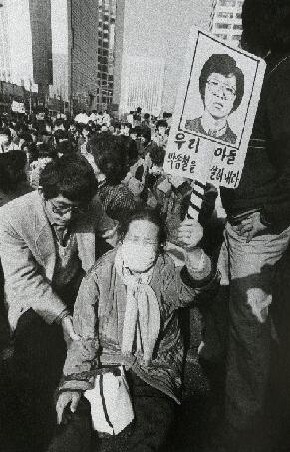hankyoreh
Links to other country sites 다른 나라 사이트 링크
TRC confirms government cover-up in Park Jong-cheol case

It has been revealed that a committee composed of the Agency for National Security Planning (ANSP, currently the National Intelligence Service), Cheong Wa Dae (the presidential office in South Korea or Blue House), prosecutors and police engaged in an organized cover-up of the “Park Jong-cheol Incident” that lit the fuse of the June 1987 Democratic Uprising.
South Korea’s Truth and Reconciliation Commission (TRC) said Sunday its investigation of the Park Jong-cheol Incident confirmed that after Park died after being tortured by police on Jan 14, 1987, the government convened a committee composed of the ANSP, the Ministry of Interior Affairs, the Ministry of Justice and the Cheong Wa Dae to cover up the death at least twice.
People have persistently raised suspicions regarding the governments’ cover-up of Park’s death, but this is the first time an official organization has been able to verify the circumstances. In order to resolve any suspicions, the commission conducted a year-long investigation in which they questioned former ANSP Chief Jang Se-dong, former Interior Minister Chung Ho-yong and former head of the Public Security Department of the Seoul District Prosecutor’s Office, Choe Hwan.
The commission said it discovered that on the day after Park’s death, Jan 15, and on Jan 16, the committee met at least twice. ANSP Chief Jang Se-song, Justice Minister Kim Sung-ki, Interior Minister Kim Chong Hoh, Prosecutor General Seo Dong-won, National Police Chief Kang Min-chang, and Cheong Wa Dae Secretary for Political Affairs Kim Yun-hwan reportedly attended the meetings.
During questioning, Jang testified that he remembered saying that nobody would believe the police story that Park died suddenly after police ‘banged’ the table, and that he, the Justice Minister, the Prosecutor General, and the National Police Chief attended the committee meeting. He said the committee convened again later to deal with the case, explaining how the matter had grown more complicated due to statements made by police officers who acted out of self-preservation after the incident became a cause of public concern.
The TRC says their interviews have confirmed that as prosecutors were carrying out their investigation, the committee decided to switch the investigative authority over to the National Police that had committed the crime, and intervened to cover up the discovery of three additional accomplices in Park’s death.
Lawyer Kim Jun-gone, a standing commissioner on the TRC, said prosecutors at the time could not protect the independence of the investigation and the case was handed over to the National Police, the guilty party, due to outside pressure. He also suggested that those who sat on the committee that participated in the cover-up and interfered in the prosecutorial investigation should publicly confess, even if belated, what they did.
The commission advised that the South Korean government officially apologize to the victims for violating the jurisdiction of the prosecutors in order to distort the truth, and that prosecutors apologize for submitting to pressure from authorities despite their Constitutionally guaranteed independence.
On January 14, 1987, nearly 20 years ago to the day, Park Jong-cheol, a 23-year-old Seoul National University student, died as a result of being tortured by the police. During his interrogation, he had been “water boarded,” his head held underwater for long periods of time. Park’s death inspired the nationwide demonstrations demanding the democratization of the nation. After decades of dictatorial rule, South Korea held a democratic election in December 1987.
Please direct questions or comments to [englishhani@hani.co.kr]
Editorial・opinion
![[Guest essay] Preventing Korean Peninsula from becoming front line of new cold war [Guest essay] Preventing Korean Peninsula from becoming front line of new cold war](https://flexible.img.hani.co.kr/flexible/normal/500/300/imgdb/original/2024/0507/7217150679227807.jpg) [Guest essay] Preventing Korean Peninsula from becoming front line of new cold war
[Guest essay] Preventing Korean Peninsula from becoming front line of new cold war![[Column] The state is back — but is it in business? [Column] The state is back — but is it in business?](https://flexible.img.hani.co.kr/flexible/normal/500/300/imgdb/original/2024/0506/8217149564092725.jpg) [Column] The state is back — but is it in business?
[Column] The state is back — but is it in business?- [Column] Life on our Trisolaris
- [Editorial] Penalties for airing allegations against Korea’s first lady endanger free press
- [Editorial] Yoon must halt procurement of SM-3 interceptor missiles
- [Guest essay] Maybe Korea’s rapid population decline is an opportunity, not a crisis
- [Column] Can Yoon steer diplomacy with Russia, China back on track?
- [Column] Season 2 of special prosecutor probe may be coming to Korea soon
- [Column] Park Geun-hye déjà vu in Yoon Suk-yeol
- [Editorial] New weight of N. Korea’s nuclear threats makes dialogue all the more urgent
Most viewed articles
- 1South Korean ambassador attends Putin’s inauguration as US and others boycott
- 2Family that exposed military cover-up of loved one’s death reflect on Marine’s death
- 3Behind-the-times gender change regulations leave trans Koreans in the lurch
- 4Yoon’s broken-compass diplomacy is steering Korea into serving US, Japanese interests
- 5Yoon’s revival of civil affairs senior secretary criticized as shield against judicial scrutiny
- 6[Guest essay] Preventing Korean Peninsula from becoming front line of new cold war
- 7Japan says its directives were aimed at increasing Line’s security, not pushing Naver buyout
- 8Marines who survived flood that killed colleague urge president to OK special counsel probe
- 9‘Weddingflation’ breaks the bank for Korean couples-to-be
- 10Amid US-China clash, Korea must remember its failures in the 19th century, advises scholar